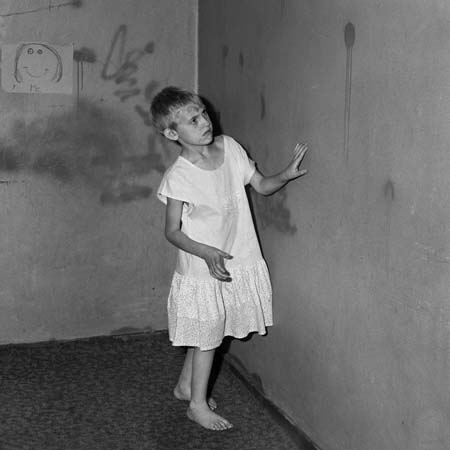
A New Collection of Photographs; Follow up to the Critically Acclaimed Outland and Shadow Chamber
“It is difficult to explain this place except that I think it exists in some way or another in most people’s mind.” –Roger Ballen
Roger Ballen’s photographs are like images from a waking dream: compelling and thought-provoking, with layers of rich details, flashes of dark humor, and an altered sense of place. Blurring the boundaries between documentary photography and art, his work is both a powerful social statement and a complex psychological study.
Phaidon Press is pleased to announce the publication of BOARDING HOUSE (Hardcover, April 2009, $69.95) by Roger Ballen, a new collection of photographs by the South African photographer. Showcasing over 70 black and white images, mostly unpublished, this is Ballen’s most formally sophisticated work to date. The tableaux have a greater emphasis on drawn and sculptural elements, and the sense of collaboration between the artist and his subjects is increasingly relevant. An introductory essay by photography curator David Travis addresses the work in an accessible way, looking at these images in the wider context of Ballen's career.
BOARDING HOUSE is a space of transient residence, of comings and goings, of people sheltered in a place they are using for their immediate survival. Basic and fundamental, the structure is furnished with objects necessary for an elementary existence, decorated with evocative drawings, and littered throughout with animals. Remnants function there as physical symbols of events that have occurred in the space; broken pieces of a functional reality exist as the leftovers of scenarios that have been played out there. The altered sense of place of this temporary abode creates a sense of alienation, which acts as a jumping off point for the imagination to run wild.
Similar to his critically acclaimed work Outland and Shadow Chamber (Phaidon Press 2001, 2005), the BOARDING HOUSE is a journey of discovery in which we leave our ordinary selves behind and confront a primitive part of the human condition and its psyche. Whether the place is real or imaginary is both indecipherable and irrelevant. It is a place where Ballen’s subconscious and the viewer’s inhibitions can occupy its own universe.

